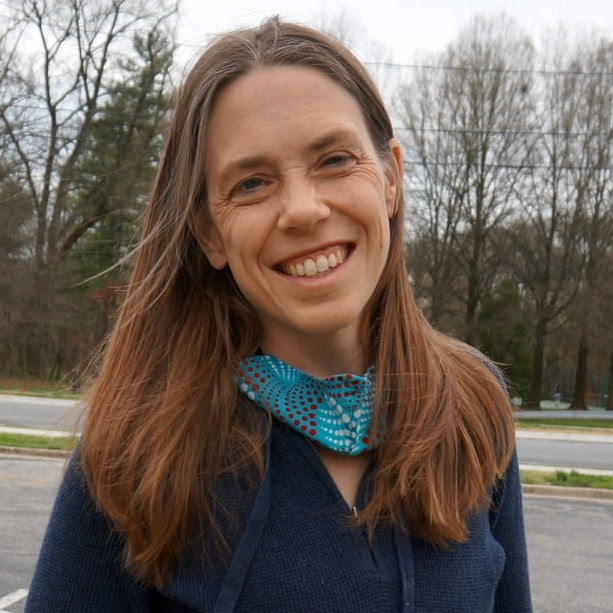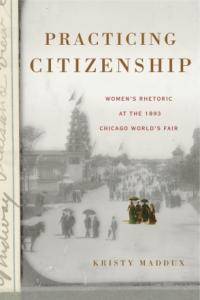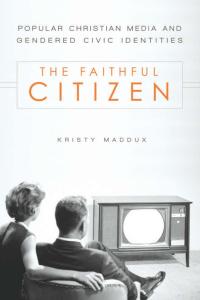Kristy Maddux

Professor, Communication
Affiliate, The Harriet Tubman Department of Women, Gender, and Sexuality Studies
Executive Director, Honors College
(301) 405-6533klmaddux@umd.edu
Anne Arundel 1114
Get Directions
Education
Ph.D., , University of Georgia
Research Expertise
Gender
Public Address
Rhetoric
Kristy Maddux is Professor of Communication and Executive Director of the Honors College at UMD. Her research and teaching are in the area of Rhetoric and Political Culture, focusing on rhetorical practices of democratic citizenship, especially how they are inflected by gender, (dis)ability, religion, race, and other identity markers. She is invested in thinking about how ordinary citizens fuel democracy through habits such as deliberation, public advocacy, protest, listening, empathy, stranger sociability, and more, as well as the structures that encourage and inhibit those habits.
One set of recent and current projects investigates how the built environment facilitates such democratic habits of citizenship—how our streets, sidewalks, benches, lighting, parks, and more shape how citizens are able to interact with each other to do the work that democracy requires. Her research examines this question in specific contexts, including the corpus of work by landscape architect Frederick Law Olmsted, the 1893 World’s Columbian Exposition fairgrounds in Chicago, and the 1960s freeway revolt in Washington, D.C.
Maddux is also working on a book manuscript, Holding our Breath: Rett Syndrome and the Search for What Makes us Human, that tells a multi-layered story about the people who have lived with this rare genetic disorder and the scientists, fundraisers, and advocates who have been working to treat and cure it for the last forty years. Putting these stories in conversation forces us to grapple with some of our most complicated questions about disability justice, bioethics, and what makes us human.
Her first book, The Faithful Citizen, examined intersections between religious media and U.S. politics, and her second book, Practicing Citizenship, re-theorized feminist practices of citizenship through the case of women’s public discourse at the 1893 World’s Columbian Exposition. Her work has been published in a number of journals including the Quarterly Journal of Speech, Rhetoric & Public Affairs, Philosophy & Rhetoric, Critical Studies in Media Communication, Rhetoric Society Quarterly, Feminist Media Studies, and the Journal for the History of Rhetoric.
She continues to teach and advise on all of these topics: feminist rhetorical history, deliberative theory, social movements, religious rhetoric, and contemporary media. As Executive Director of the Honors College, she oversees eight living-learning programs enrolling approximately 2000 students, along with departmental and college honors programs across campus.
Publications
Viewing Deliberation: Daytime Television's Public Pedagogy of Inclusion
Analysis considers how The View offers a public pedagogy of deliberation.
Author/Lead: Kristy Maddux
Televised deliberation has been celebrated for its accessibility and derided for its tendency toward spectacle. Deliberative theorists and practitioners seek ways to make deliberation more inclusive because widespread participation facilitates deliberative legitimacy. This analysis operates between these two challenges, to consider how the daytime television show The View, drawing upon the televisual logics of spectacle and intimacy, nonetheless offers a public pedagogy of deliberation that provides resources for facilitating inclusive deliberation. I argue that the show models deliberators overcoming typical barriers to deliberation, such as disagreement and discomfort, with five deliberative habits: everyday talk, civility, agreement, friendship, and humor.
Read More about Viewing Deliberation: Daytime Television's Public Pedagogy of Inclusion
Practicing Citizenship: Women's Rhetoric at the 1893 Chicago World's Fair
Practicing Citizenship provides a glimpse at an unprecedented alternative act of citizenship by women of the time: their deliberative participation in the Chicago World’s Fair of 1893.
Author/Lead: Kristy Maddux
By 1893, the Supreme Court had officially declared women to be citizens, but most did not have the legal right to vote. In Practicing Citizenship, Kristy Maddux provides a glimpse at an unprecedented alternative act of citizenship by women of the time: their deliberative participation in the Chicago World’s Fair of 1893.
Hailing from the United States and abroad, the more than eight hundred women speakers at the World’s Fair included professionals, philanthropists, socialites, and reformers addressing issues such as suffrage, abolition, temperance, prison reform, and education. Maddux examines the planning of the event, the full program of women speakers, and dozens of speeches given in the fair’s daily congresses. In particular, she analyzes the ways in which these women shaped the discourse at the fair and modeled to the world practices of democratic citizenship, including deliberative democracy, racial uplift, organizing, and economic participation. In doing so, Maddux shows how these pioneering women claimed sociopolitical ground despite remaining disenfranchised.
This carefully researched study makes significant contributions to the studies of rhetoric, American women’s history, political history, and the history of the World’s Fair itself. Most importantly, it sheds new light on women’s activism in the late nineteenth century; even amidst the suffrage movement, women innovated practices of citizenship beyond the ballot box.
Read More about Practicing Citizenship: Women's Rhetoric at the 1893 Chicago World's Fair
The Faithful Citizen: Popular Christian Media and Gendered Civic Identities
Argues that popular Christian media not only communicate avenues for civic engagement but do so in profoundly gendered terms.
Author/Lead: Kristy MadduxAward Organization:
2011 Outstanding Book Award from the Organization for the Study of Communication, Language, and Gender
2011 Book of the Year Award from the Religious Communication Association

For decades, American popular media have instructed audiences about their roles and significance in the public sphere. In The Faithful Citizen, rhetorical critic Kristy Maddux argues that popular Christian media not only communicate avenues for civic engagement but do so in profoundly gendered terms. Her detailed interrogation of popular Christian movies, books, and television shows—the Left Behind series, Mel Gibson's The Passion of the Christ, Amazing Grace, 7th Heaven, and the blockbuster The Da Vinci Code—exposes five competing models of how Christians should behave in the civic sphere as their gendered selves. What emerges is a typology that insightfully reveals how these varying faith-based models of engagement uniquely shape public discourse and influence the larger picture of contemporary politics.
Read More about The Faithful Citizen: Popular Christian Media and Gendered Civic Identities

